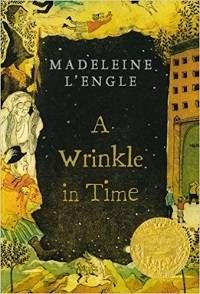
In Praise of Childhood Favorites That Lose Their Magic

The audiobook is excellent. I enjoyed falling back into a world that I loved so much as a kid. I wasn’t disappointed by it, I didn’t dislike it, and I didn’t find it troubling or problematic like some other childhood favorites I’ve revisited. It was perfectly good. But it didn’t make me feel much. The magic was gone.
I’m not sure that I can adequately state how important A Wrinkle in Time was to me as a young person. I still credit it as one of the books that made me a reader (the other being The Lord of the Rings), and specifically the book that made me a lifelong science fiction and fantasy lover. I identified so fiercely with Meg. Charles Wallace was one of the first characters whose fictional status broke my heart. I remember feeling a physical pain that he (and Meg and Calvin) weren’t real because I knew we were all supposed to be best friends.
I loved the Time Quintet so much that I went on to read every other book L’Engle had ever published, and I’m not just talking about her young adult books. I read her adult novels The Small Rain and A Severed Wasp, as well as her memoir about her marriage, Two-Part Invention, when I was twelve. I don’t think I really understood those books. What I remember is that the Time Quintet was so important to me, so much a part of me, that it made me want to devour all of L’Engle’s words. It was a powerful feeling.
I had a similar experience a few years back when I reread Phillip Pullman’s His Dark Materials trilogy. I first read His Dark Materials in middle and high school, and once again, I simply cannot overstate how deeply the series influenced me. One of my most visceral memories from my teen years is lying on my bed, finishing The Amber Spyglass and weeping uncontrollably. No book had ever made me weep so much, or simply feel so much. In those books, in that world, I felt like like I belonged unconditionally, at a time in my life when sometimes it felt like I didn’t belong anywhere.
I enjoyed the His Dark Materials as an adult. The beautiful writing and world-building, the wonderful characters, the sheer creativity—it was all still there. But the magic was gone. There was no sense of falling off a cliff into a world so perfect and breathtaking that I never wanted to leave it. I didn’t feel seen and held and understood like the books were written for me alone.
At first, this made me sad. I craved that feeling of immersion I’d had when I was a kid. I wanted A Winkle in Time to be what it had always been for me. I wanted The Amber Spyglass to make me weep uncontrollably again. But as I thought about, I realized that the fact that these books had lost their magic actually made me love them more.
Children do not experience the world the way adults do. Being a child (or a teenager) doesn’t feel the same as being an adult. So why should books that change us so profoundly as children and teens have to do so again when we are adults? I often find myself thinking about the fact that no one really knows what it feels like to be a baby. We all experience it, but we don’t remember it, and so the experience becomes a secret kept by infants, one that we all eventually grow out of. There’s something magical and miraculous about that. I think it’s the same with beloved childhood books that lose their magic as we age.
Maybe these books don’t lose their magic because they’re not good enough, but because their magic is specific to the experience of childhood. Maybe there’s something in these books that speaks to the open curiosity of children, to the feeling of being a small human in a big world, or a young person with a brain still discovering itself. Maybe the very best books from our childhoods—the ones that shaped us, the ones that made us fall in love with reading and taught us how strong we were and showed us the dizzying array of possibilities in the universe—simply have a magic that adults can’t understand.
I’ve got plans to reread some more my most beloved childhood favorites in the next few years—Susan Cooper’s The Dark Is Rising series, Ursula Le Guin’s Earthsea Cycle, The Secret Garden. Perhaps, like Lord of the Rings, a book whose magic, for me, only grows as I age, these books will feel as important to me now as they did when I was nine. Or perhaps their magic will be gone. Either way, the one thing I know I’ll never lose is the memory of reading them as a child, and the magic I found in their pages—a magic that I may no longer understand, but that no one can ever take away.







